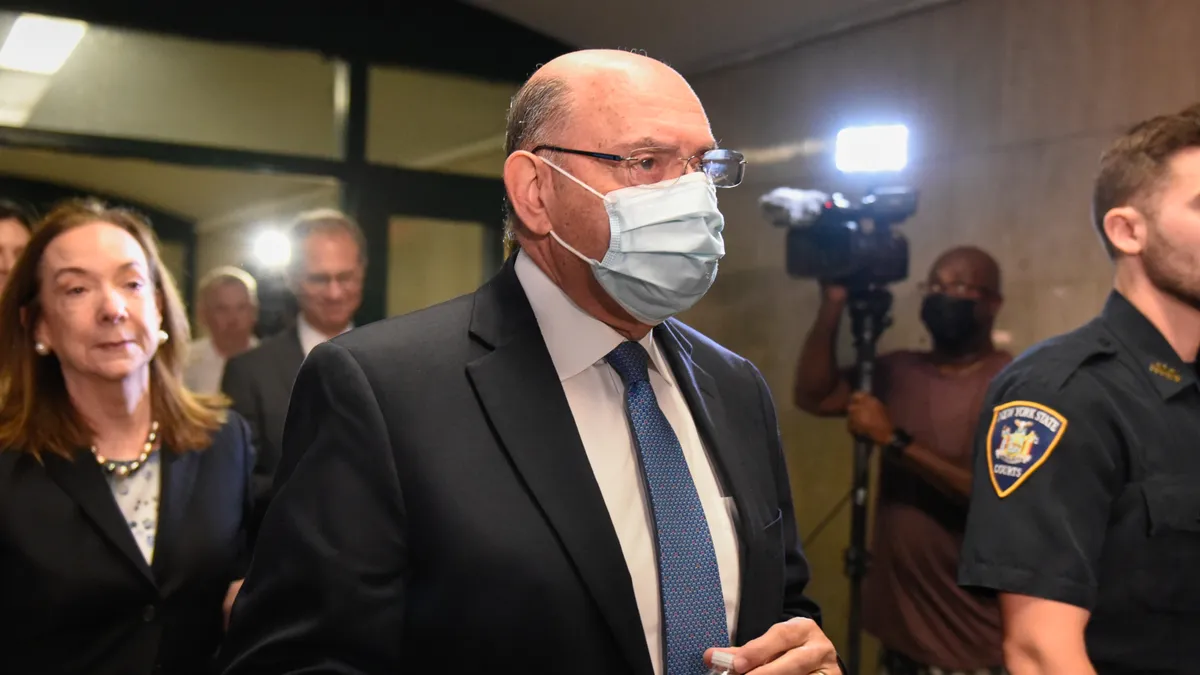If ex-Trump Organization CFO Allen Weisselberg pleads guilty to a felony perjury charge — and it is not clear that he will — he could potentially be sentenced to serve time in state prison, criminal defense attorneys told CFO Dive.
Weisselberg is reportedly in talks with the Manhattan District Attorney’s Office for a potential deal that would require the former Trump finance chief to admit he lied under oath during New York Attorney General Letitia James’ recent civil fraud case against his former employer, The New York Times reported last week.
Perjury can be classed as either a misdemeanor or as a felony, according to New York state’s penal code. As Weisselberg previously pled guilty to felony charges of tax fraud in the state, having a second felony conviction within a decade of one’s first such offense would classify him as a “predicate felon,” and would mandate a stint in state prison commiserate to the offense, according to Michael Bachner, a partner at the law firm of Bachner & Associates.
While it’s unclear if the perjury plea would be for that of a felony or a misdemeanor offense — the possibility of a second felony “certainly exposes him to a mandatory state prison sentence,” Bachner, whose past experience includes a tenure as assistant DA for the New York County District Attorneys Office, told CFO Dive. Bachner is not affiliated with the case.
Weisselberg’s attorney Seth Rosenberg did not respond to requests for comment on the plea report and the AG’s office has declined to comment.
Weisselberg and his attorneys may be looking to work out a cooperation agreement with the Manhattan DA’s office, which could potentially entail Weisselberg pleading guilty to a misdemeanor — a move that would allow him to avoid time in a state prison, Bachner postulated.
The reported deal represents the latest twist in a complicated legal situation for the former CFO, who is deeply emmeshed in the legal battles facing ex-president Donald Trump and the Trump Organization in New York. News of talks between Weisselberg and the DA’s office come as DA Alvin Bragg prepares to bring former President Donald Trump back into court; Bragg’s office is alleging that Trump committed electoral and financial crimes in connection with a hush-money payment related to the 2016 election.
Meanwhile, Trump is also awaiting a ruling in the civil fraud case against the Trump Organization, where Weisselberg testified about key matters including disputed property valuations. Presiding Judge Arthur Engoron, who is expected to issue his ruling on the case any day, recently asked for clarity on the matter of potential perjury in an email sent to both the NY AG and Trump’s attorneys.
“As the presiding magistrate, the trier of fact, and the judge of credibility, I of course want to know whether Mr. Weisselberg is now changing his tune, and whether he is admitting he lied under oath in my courtroom at this trial,” Engoron wrote in a Tuesday email. “Although the Times article focuses on the size of the Trump Tower Penthouse, his testimony on other topics could also be called into question. I also may use this as a basis to invoke falsus in uno.”
Perjury, Engoron wrote, “undermines the broader ends of justice and cannot be ignored. I do not want to ignore anything in a case of this magnitude.”
A perjury charge against Weisselberg could certainly have an impact on the civil fraud matter, though it’s unclear how significant such an impact will be, Bachner told CFO Dive in a conversation before the Tuesday email. Weisselberg, also a named defendant in the civil case, could face a lifetime ban from the state’s real estate industry alongside Trump, with the Trump Organization also facing the possibility of a $370 million fine.
Weisselberg testified on disputed property valuations during the trial. NY AG attorneys highlighted omitted data, referencing an October Forbes report which alleged he had lied about the Trump’s penthouse in Trump Tower during his time on the stand. The New York Times reported that the plea deal will likely not require him to testify again during Bragg’s criminal case.
“It depends on the deal that they’re offering him but having him testify…they may feel they really don't need him,” Bachner said. “I think his credibility may be so suspect at this point that that they just won't want to call him.”
While a guilty perjury plea could potentially impact the outcome of the civil fraud trial and potentially open Weisselberg up to jail time, it also could come with still more legal consequences for the ex-CFO — who would have been on probation in the state at the time the alleged perjury took place.
In his previous plea agreement with the Manhattan DA, Weisselberg was required to give truthful testimony during the trial of two Trump Organization entities that were also convicted of tax fraud, as well as pay $2 million in back taxes, interest and penalties. As part of the deal, he was also sentenced to five months in prison and to five years of probation, according to a January 2023 release by the DA’s office.
Law enforcement has several options they can take when it is alleged that someone violated their probation—they could “charge you with a new crime,” Peter Tilem, senior partner at Tilem & Associates said, which would work its way through the criminal justice system where one would need to prove guilt beyond a reasonable doubt. Tilem is not affiliated with the case.
Law enforcement can also “just charge you with violating the terms of your probation,” Tilem said, which would allow them to short-circuit a lot of that process. “And of course, the last option would be that they could do both.”



















